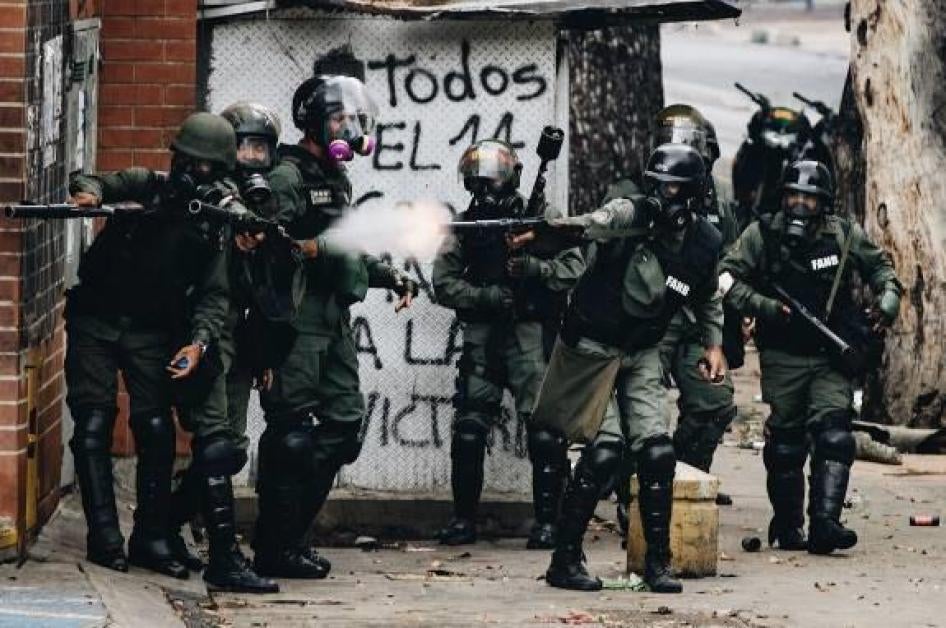On June 19, foreign ministers from throughout the Americas will meet in Mexico to forge a common response to these repressive practices. Given the president’s intransigence, they would do well to focus their attention on those responsible for carrying out the repression. The likelihood of a peaceful transition could very well depend on how far these other Venezuelan officials — including members of security forces — are willing to go to keep him in power.
Last month, a secret recording surfaced in multiple news outlets of a group of Venezuelan generals at a regional command center wrestling with this question. “There will come a moment when we’ll have to use them,” one says, referring to the use of snipers during street demonstrations, “because the president isn’t going to stay just with the [initial] phase” of his plan for responding to anti-government protests.
“If you tell me to go out there,” another responds, “I will do it. I will accomplish the mission. But I know tomorrow we might not have backing for any mistake that’s made, and that’s what we’re worried about.” More specifically, he then says, they fear they can no longer count on the attorney general’s office to “protect” them. “The day may come when any of us could find ourselves in jail.”
Until recently, these officers had little reason to worry. The last time the Maduro government carried out a prolonged crackdown on anti-government protests, in 2014, Attorney General Luisa Ortega Díaz made no serious effort to prosecute the widespread abuses committed by security forces — which included arbitrary arrests, beatings, torture, and killing peaceful protesters. Instead, her prosecutors abetted the crackdown, concocting bogus criminal cases against torture victims and political opponents.
Now, though, the very same attorney general has begun speaking up for the rights of protesters. Over the past month, she has complained of arbitrary detentions by security forces and requested that courts release dozens of detainees. On May 24 — just days after the recording of the generals surfaced — she announced that her office is pursuing criminal charges against dozens of members of security forces for alleged abuses. And more recently she has challenged the legality of a proposal by Maduro to rewrite the Venezuelan constitution, as well as the 2015 packing of the Supreme Court with pro-government judges.
Why this newfound concern for the rule of law? Many things have changed since 2014 — most important, the intensity of anti-government animus, caused in large part by the devastating toll that severe shortages of food and medicine have taken on the population.
But there’s another change that has been key: Governments throughout the Americas have finally begun to denounce Maduro’s authoritarian rule. After the 2014 crackdown, then-U.S. President Barack Obama, prompted by bipartisan concern in the U.S. Congress, imposed targeted sanctions on specific Venezuelan officials implicated in corruption and human rights crimes — including, in 2015, one of the prosecutors involved in jailing Maduro’s critics. The Trump administration has continued Obama’s approach, imposing targeted sanctions on more officials, including members of Venezuela’s Supreme Court.
Latin American leaders, who were largely silent in 2014, have increasingly spoken up over the past year. In March, 14 states — including Brazil, Chile, Mexico, and Peru — issued a joint declaration calling on Venezuela to take three steps toward restoring democratic rule: release its political prisoners, hold elections, and reestablish the separation of powers.
The U.S. sanctions gave Venezuelan officials their first reason to fear that committing abuses could cause them trouble. But the collective condemnation by their neighbors — including governments whose predecessors once backed Hugo Chávez and Maduro — showed them that the international community was no longer willing to accept their government’s authoritarian practices. Together, these responses have changed the cost-benefit analysis for officials’ complicity in human-rights crimes. Little wonder that the attorney general has begun to distance herself from the crackdown, and the military generals have begun to fear that killing protesters could eventually land them in jail.
And it’s not just the generals on the tape who seem to be getting nervous. On June 6, Maduro’s defense minister, Gen. Vladimir Padrino López, surprised the country by declaring in a televised address: “I don’t want to see another member of the National Guard committing an atrocity on the street.” Those who commit abuses, he warned, would have to “assume their responsibility.” But given his record overseeing the crackdown — which has not let up — the statement sounded less like a directive and more like an effort to duck his own complicity.
At the upcoming meeting in Mexico — which will take place during the General Assembly of the Organization of American States — the 14 countries will seek to rally others to back their three demands for restoring democratic rule in Venezuela. To discourage further violence, they should add a fourth: that officials responsible for human rights crimes — whether torturing and killing protesters or jailing political prisoners — should be brought to justice.
It remains to be seen how serious the attorney general is about prosecuting abuses. Even if she tries, obtaining convictions will be extremely difficult in a court system controlled by the president. Still, by pressing for accountability, the international community will give the generals all the more reason to fear that any abuses they commit will get them punished — if not now, then in a not-too-distant future when the rule of law is restored.
During past political crises in Latin America, there have always been those who argued that demands for justice would deter those in power from ending their repressive rule. But given that Maduro already seems determined to hold on to power at all costs, the top priority of the international community should be to prevent him from ramping up the repression. Any government that must rely on snipers to contain popular discontent is likely to meet its end the day its field officers refuse to obey orders to shoot.







